Research Project: Talent Management in Tour Operations at TUI
VerifiedAdded on 2023/01/10
|23
|5713
|42
Project
AI Summary
This research project investigates talent management within the tour operations industry, using TUI as a case study. The project begins with an overview of talent management, its importance, and the context of the travel and tourism sector. It explores the background of the study, the research problem, aims, objectives, and research questions. Chapter 2 provides a literature review, examining the purpose of talent management, TUI's approach to employee development and retention, and areas for improvement. Chapter 3 details the research methodology, including the research philosophy, type of investigation, and data collection methods. Chapter 4 presents the results and findings, followed by a discussion of the primary investigation and literature review. The project concludes with recommendations and a reflection on the research process, alongside a comprehensive list of references. The assignment covers key aspects of talent management, including recruitment, training, performance appraisal, and retention strategies within the context of a major player in the travel and tourism industry.
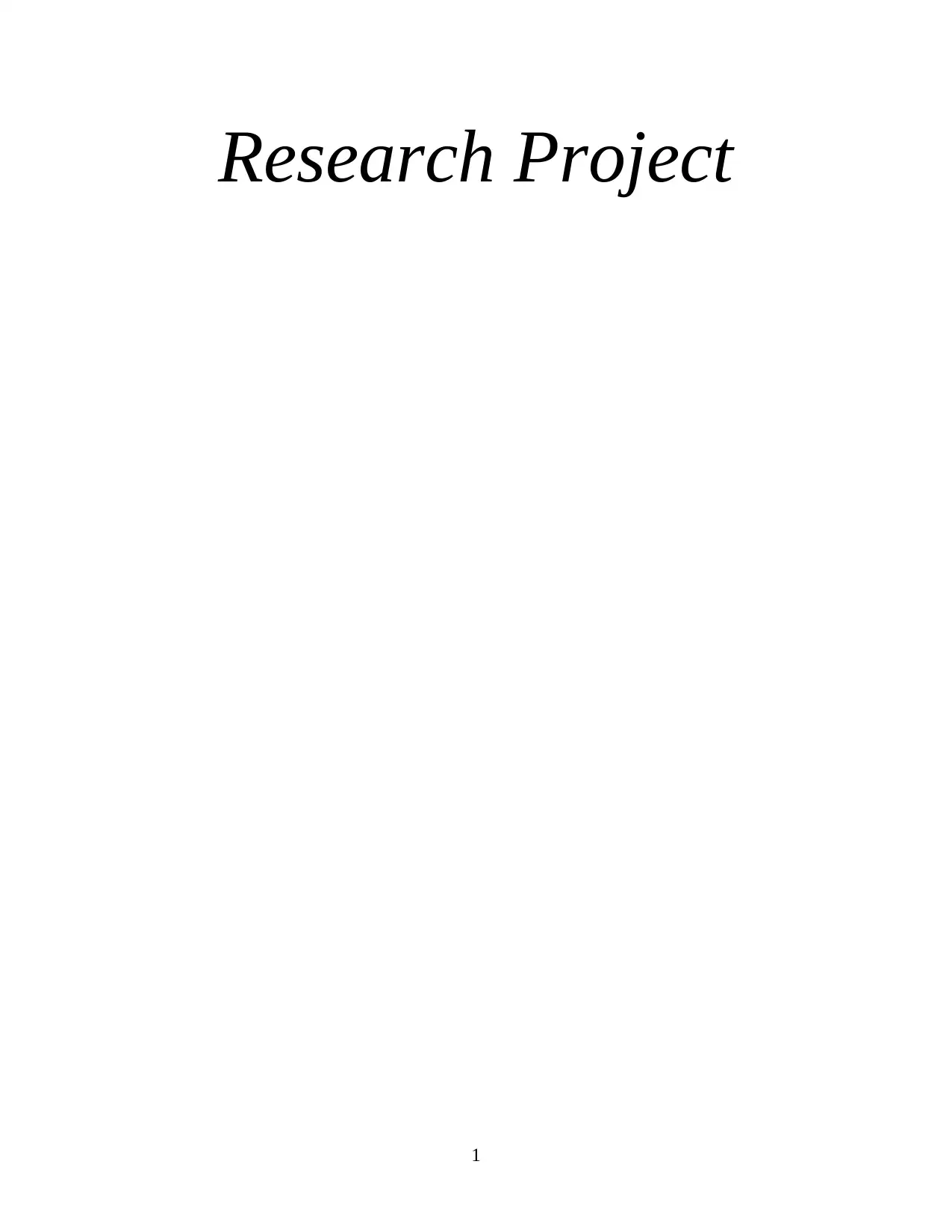
Research Project
1
1
Paraphrase This Document
Need a fresh take? Get an instant paraphrase of this document with our AI Paraphraser
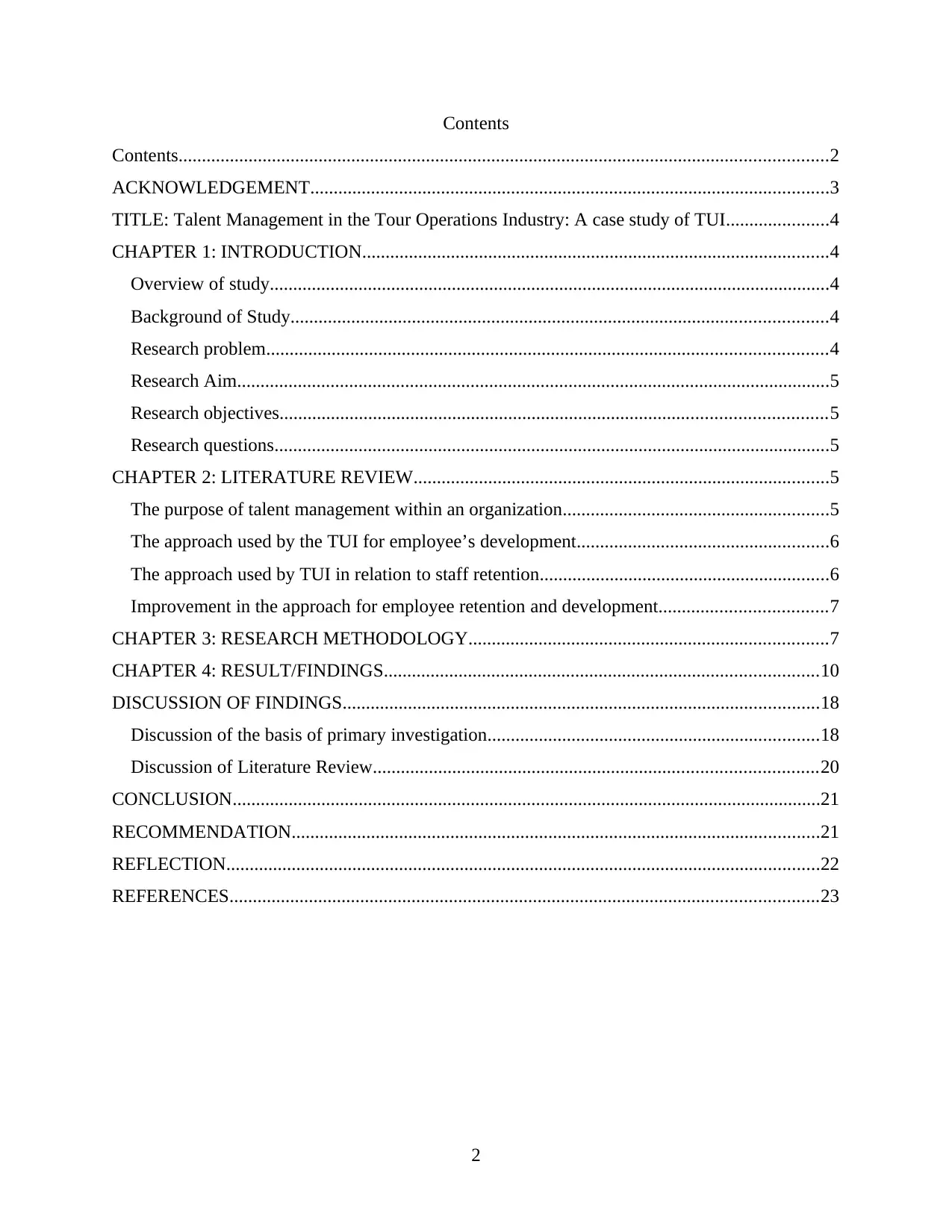
Contents
Contents...........................................................................................................................................2
ACKNOWLEDGEMENT...............................................................................................................3
TITLE: Talent Management in the Tour Operations Industry: A case study of TUI......................4
CHAPTER 1: INTRODUCTION....................................................................................................4
Overview of study........................................................................................................................4
Background of Study...................................................................................................................4
Research problem........................................................................................................................4
Research Aim...............................................................................................................................5
Research objectives.....................................................................................................................5
Research questions.......................................................................................................................5
CHAPTER 2: LITERATURE REVIEW.........................................................................................5
The purpose of talent management within an organization.........................................................5
The approach used by the TUI for employee’s development......................................................6
The approach used by TUI in relation to staff retention..............................................................6
Improvement in the approach for employee retention and development....................................7
CHAPTER 3: RESEARCH METHODOLOGY.............................................................................7
CHAPTER 4: RESULT/FINDINGS.............................................................................................10
DISCUSSION OF FINDINGS......................................................................................................18
Discussion of the basis of primary investigation.......................................................................18
Discussion of Literature Review...............................................................................................20
CONCLUSION..............................................................................................................................21
RECOMMENDATION.................................................................................................................21
REFLECTION...............................................................................................................................22
REFERENCES..............................................................................................................................23
2
Contents...........................................................................................................................................2
ACKNOWLEDGEMENT...............................................................................................................3
TITLE: Talent Management in the Tour Operations Industry: A case study of TUI......................4
CHAPTER 1: INTRODUCTION....................................................................................................4
Overview of study........................................................................................................................4
Background of Study...................................................................................................................4
Research problem........................................................................................................................4
Research Aim...............................................................................................................................5
Research objectives.....................................................................................................................5
Research questions.......................................................................................................................5
CHAPTER 2: LITERATURE REVIEW.........................................................................................5
The purpose of talent management within an organization.........................................................5
The approach used by the TUI for employee’s development......................................................6
The approach used by TUI in relation to staff retention..............................................................6
Improvement in the approach for employee retention and development....................................7
CHAPTER 3: RESEARCH METHODOLOGY.............................................................................7
CHAPTER 4: RESULT/FINDINGS.............................................................................................10
DISCUSSION OF FINDINGS......................................................................................................18
Discussion of the basis of primary investigation.......................................................................18
Discussion of Literature Review...............................................................................................20
CONCLUSION..............................................................................................................................21
RECOMMENDATION.................................................................................................................21
REFLECTION...............................................................................................................................22
REFERENCES..............................................................................................................................23
2
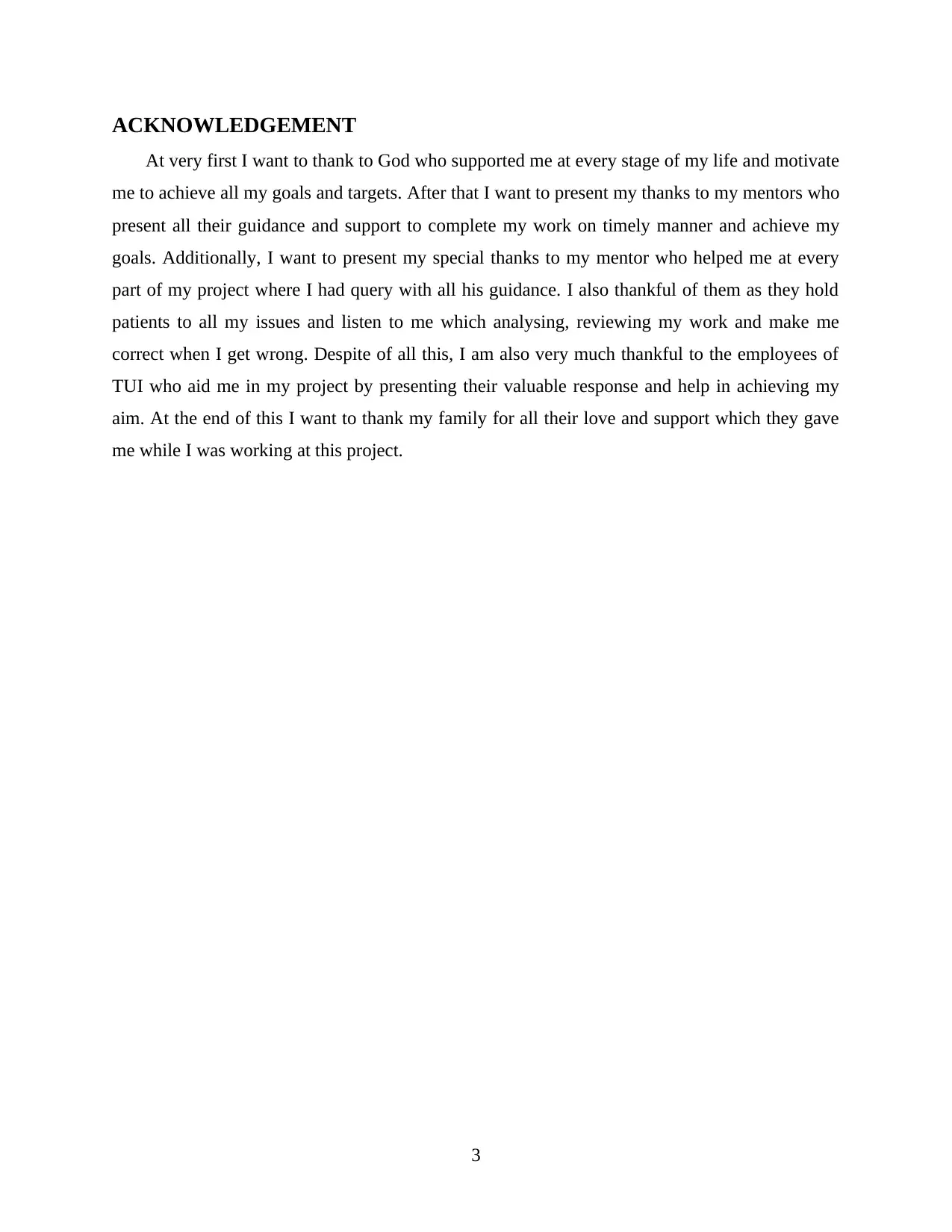
ACKNOWLEDGEMENT
At very first I want to thank to God who supported me at every stage of my life and motivate
me to achieve all my goals and targets. After that I want to present my thanks to my mentors who
present all their guidance and support to complete my work on timely manner and achieve my
goals. Additionally, I want to present my special thanks to my mentor who helped me at every
part of my project where I had query with all his guidance. I also thankful of them as they hold
patients to all my issues and listen to me which analysing, reviewing my work and make me
correct when I get wrong. Despite of all this, I am also very much thankful to the employees of
TUI who aid me in my project by presenting their valuable response and help in achieving my
aim. At the end of this I want to thank my family for all their love and support which they gave
me while I was working at this project.
3
At very first I want to thank to God who supported me at every stage of my life and motivate
me to achieve all my goals and targets. After that I want to present my thanks to my mentors who
present all their guidance and support to complete my work on timely manner and achieve my
goals. Additionally, I want to present my special thanks to my mentor who helped me at every
part of my project where I had query with all his guidance. I also thankful of them as they hold
patients to all my issues and listen to me which analysing, reviewing my work and make me
correct when I get wrong. Despite of all this, I am also very much thankful to the employees of
TUI who aid me in my project by presenting their valuable response and help in achieving my
aim. At the end of this I want to thank my family for all their love and support which they gave
me while I was working at this project.
3
⊘ This is a preview!⊘
Do you want full access?
Subscribe today to unlock all pages.

Trusted by 1+ million students worldwide
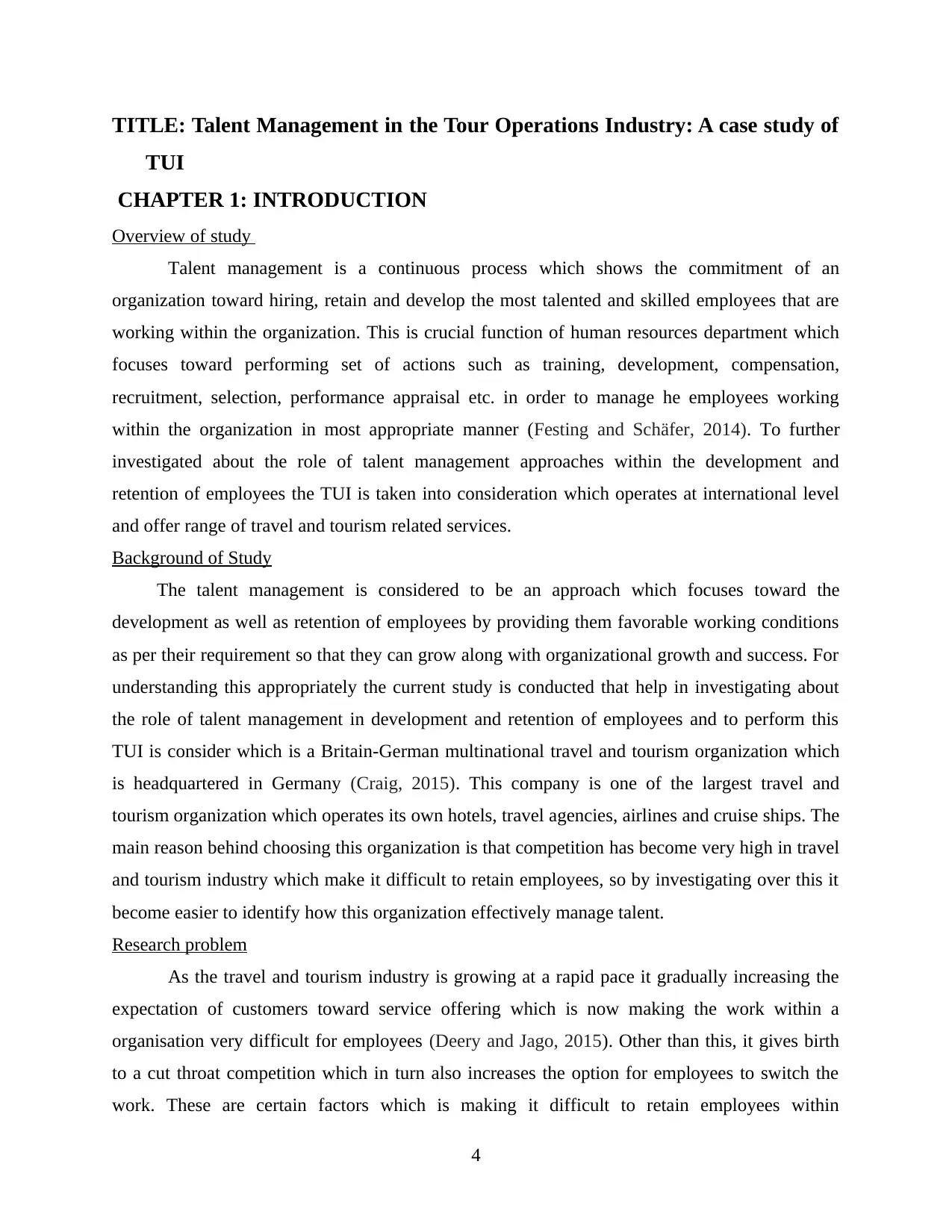
TITLE: Talent Management in the Tour Operations Industry: A case study of
TUI
CHAPTER 1: INTRODUCTION
Overview of study
Talent management is a continuous process which shows the commitment of an
organization toward hiring, retain and develop the most talented and skilled employees that are
working within the organization. This is crucial function of human resources department which
focuses toward performing set of actions such as training, development, compensation,
recruitment, selection, performance appraisal etc. in order to manage he employees working
within the organization in most appropriate manner (Festing and Schäfer, 2014). To further
investigated about the role of talent management approaches within the development and
retention of employees the TUI is taken into consideration which operates at international level
and offer range of travel and tourism related services.
Background of Study
The talent management is considered to be an approach which focuses toward the
development as well as retention of employees by providing them favorable working conditions
as per their requirement so that they can grow along with organizational growth and success. For
understanding this appropriately the current study is conducted that help in investigating about
the role of talent management in development and retention of employees and to perform this
TUI is consider which is a Britain-German multinational travel and tourism organization which
is headquartered in Germany (Craig, 2015). This company is one of the largest travel and
tourism organization which operates its own hotels, travel agencies, airlines and cruise ships. The
main reason behind choosing this organization is that competition has become very high in travel
and tourism industry which make it difficult to retain employees, so by investigating over this it
become easier to identify how this organization effectively manage talent.
Research problem
As the travel and tourism industry is growing at a rapid pace it gradually increasing the
expectation of customers toward service offering which is now making the work within a
organisation very difficult for employees (Deery and Jago, 2015). Other than this, it gives birth
to a cut throat competition which in turn also increases the option for employees to switch the
work. These are certain factors which is making it difficult to retain employees within
4
TUI
CHAPTER 1: INTRODUCTION
Overview of study
Talent management is a continuous process which shows the commitment of an
organization toward hiring, retain and develop the most talented and skilled employees that are
working within the organization. This is crucial function of human resources department which
focuses toward performing set of actions such as training, development, compensation,
recruitment, selection, performance appraisal etc. in order to manage he employees working
within the organization in most appropriate manner (Festing and Schäfer, 2014). To further
investigated about the role of talent management approaches within the development and
retention of employees the TUI is taken into consideration which operates at international level
and offer range of travel and tourism related services.
Background of Study
The talent management is considered to be an approach which focuses toward the
development as well as retention of employees by providing them favorable working conditions
as per their requirement so that they can grow along with organizational growth and success. For
understanding this appropriately the current study is conducted that help in investigating about
the role of talent management in development and retention of employees and to perform this
TUI is consider which is a Britain-German multinational travel and tourism organization which
is headquartered in Germany (Craig, 2015). This company is one of the largest travel and
tourism organization which operates its own hotels, travel agencies, airlines and cruise ships. The
main reason behind choosing this organization is that competition has become very high in travel
and tourism industry which make it difficult to retain employees, so by investigating over this it
become easier to identify how this organization effectively manage talent.
Research problem
As the travel and tourism industry is growing at a rapid pace it gradually increasing the
expectation of customers toward service offering which is now making the work within a
organisation very difficult for employees (Deery and Jago, 2015). Other than this, it gives birth
to a cut throat competition which in turn also increases the option for employees to switch the
work. These are certain factors which is making it difficult to retain employees within
4
Paraphrase This Document
Need a fresh take? Get an instant paraphrase of this document with our AI Paraphraser
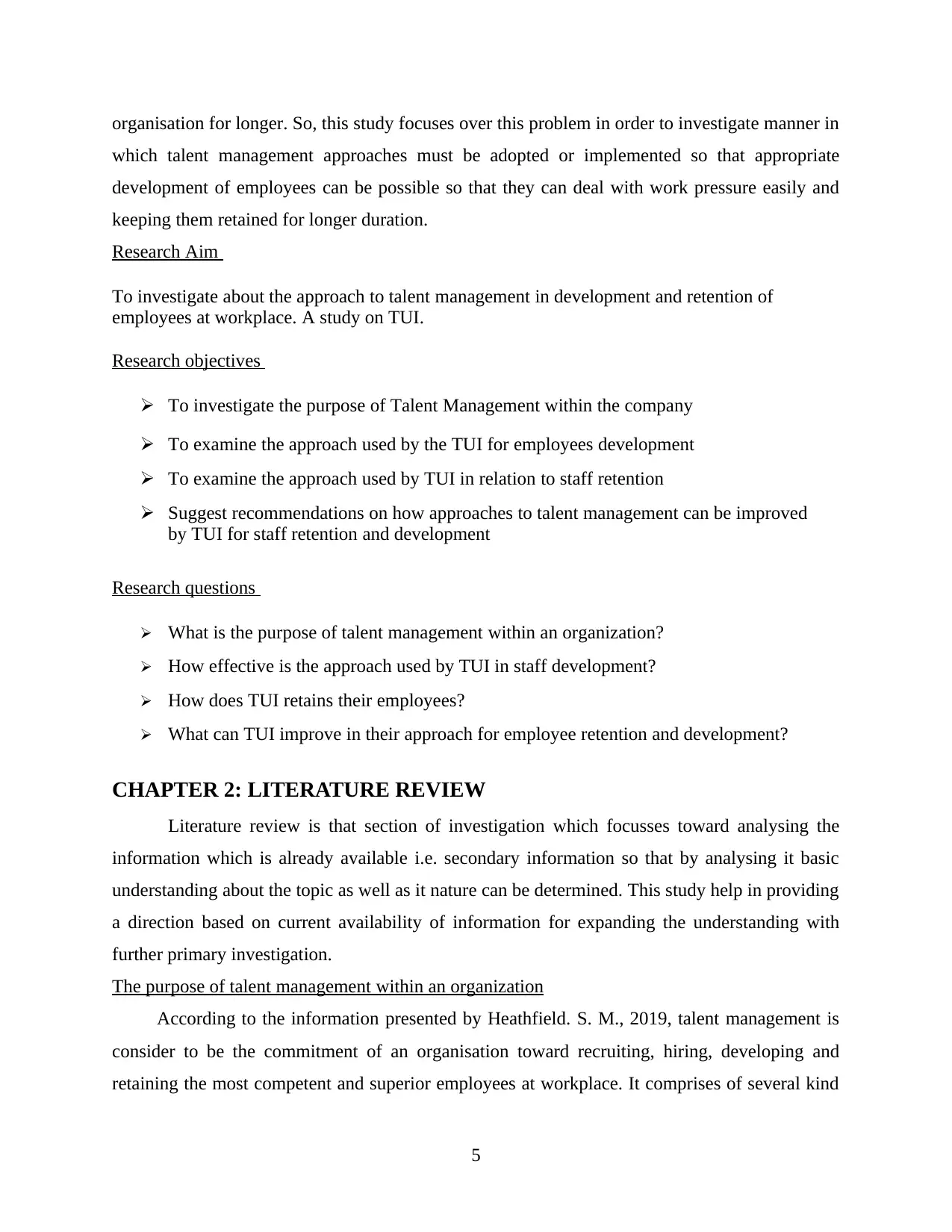
organisation for longer. So, this study focuses over this problem in order to investigate manner in
which talent management approaches must be adopted or implemented so that appropriate
development of employees can be possible so that they can deal with work pressure easily and
keeping them retained for longer duration.
Research Aim
To investigate about the approach to talent management in development and retention of
employees at workplace. A study on TUI.
Research objectives
To investigate the purpose of Talent Management within the company
To examine the approach used by the TUI for employees development
To examine the approach used by TUI in relation to staff retention
Suggest recommendations on how approaches to talent management can be improved
by TUI for staff retention and development
Research questions
What is the purpose of talent management within an organization?
How effective is the approach used by TUI in staff development?
How does TUI retains their employees?
What can TUI improve in their approach for employee retention and development?
CHAPTER 2: LITERATURE REVIEW
Literature review is that section of investigation which focusses toward analysing the
information which is already available i.e. secondary information so that by analysing it basic
understanding about the topic as well as it nature can be determined. This study help in providing
a direction based on current availability of information for expanding the understanding with
further primary investigation.
The purpose of talent management within an organization
According to the information presented by Heathfield. S. M., 2019, talent management is
consider to be the commitment of an organisation toward recruiting, hiring, developing and
retaining the most competent and superior employees at workplace. It comprises of several kind
5
which talent management approaches must be adopted or implemented so that appropriate
development of employees can be possible so that they can deal with work pressure easily and
keeping them retained for longer duration.
Research Aim
To investigate about the approach to talent management in development and retention of
employees at workplace. A study on TUI.
Research objectives
To investigate the purpose of Talent Management within the company
To examine the approach used by the TUI for employees development
To examine the approach used by TUI in relation to staff retention
Suggest recommendations on how approaches to talent management can be improved
by TUI for staff retention and development
Research questions
What is the purpose of talent management within an organization?
How effective is the approach used by TUI in staff development?
How does TUI retains their employees?
What can TUI improve in their approach for employee retention and development?
CHAPTER 2: LITERATURE REVIEW
Literature review is that section of investigation which focusses toward analysing the
information which is already available i.e. secondary information so that by analysing it basic
understanding about the topic as well as it nature can be determined. This study help in providing
a direction based on current availability of information for expanding the understanding with
further primary investigation.
The purpose of talent management within an organization
According to the information presented by Heathfield. S. M., 2019, talent management is
consider to be the commitment of an organisation toward recruiting, hiring, developing and
retaining the most competent and superior employees at workplace. It comprises of several kind
5
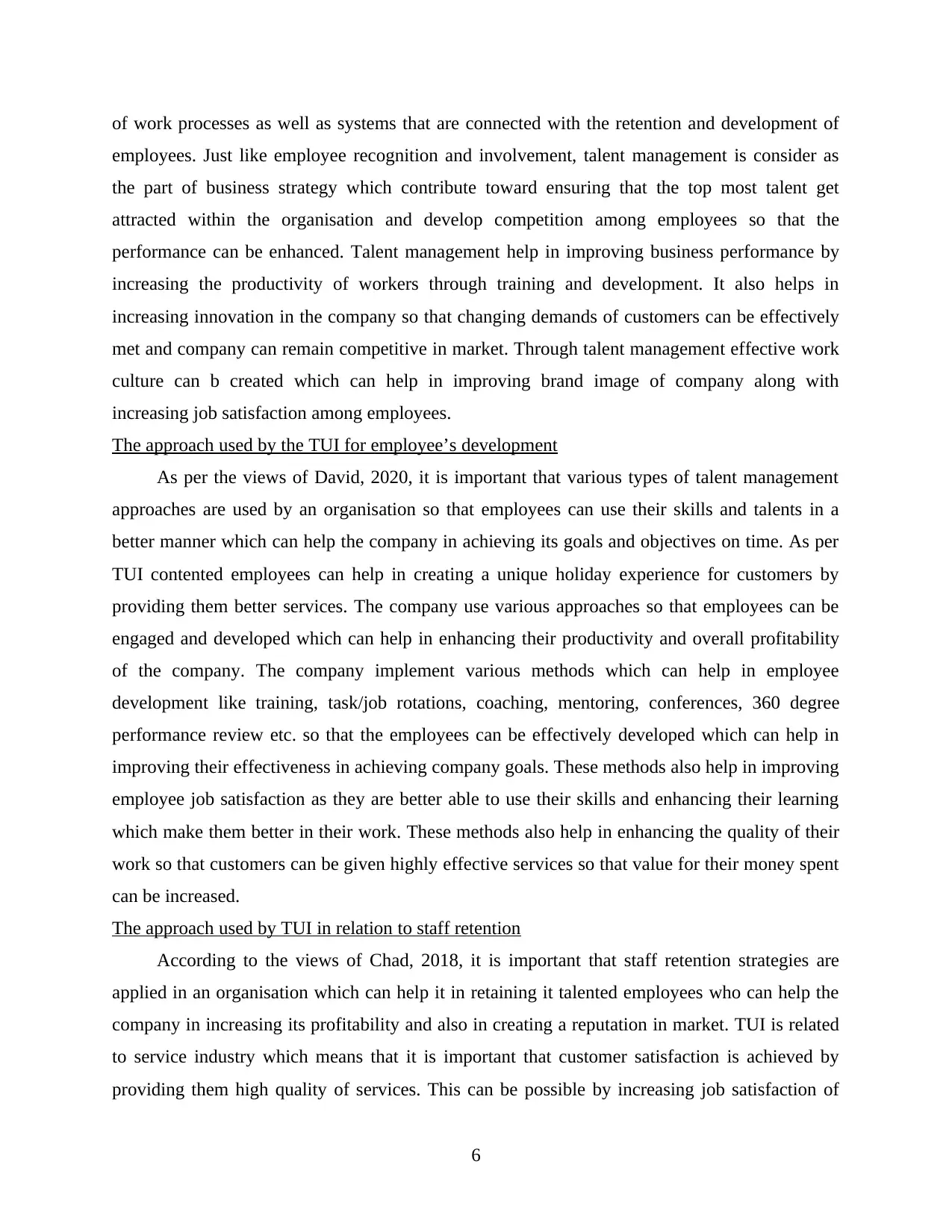
of work processes as well as systems that are connected with the retention and development of
employees. Just like employee recognition and involvement, talent management is consider as
the part of business strategy which contribute toward ensuring that the top most talent get
attracted within the organisation and develop competition among employees so that the
performance can be enhanced. Talent management help in improving business performance by
increasing the productivity of workers through training and development. It also helps in
increasing innovation in the company so that changing demands of customers can be effectively
met and company can remain competitive in market. Through talent management effective work
culture can b created which can help in improving brand image of company along with
increasing job satisfaction among employees.
The approach used by the TUI for employee’s development
As per the views of David, 2020, it is important that various types of talent management
approaches are used by an organisation so that employees can use their skills and talents in a
better manner which can help the company in achieving its goals and objectives on time. As per
TUI contented employees can help in creating a unique holiday experience for customers by
providing them better services. The company use various approaches so that employees can be
engaged and developed which can help in enhancing their productivity and overall profitability
of the company. The company implement various methods which can help in employee
development like training, task/job rotations, coaching, mentoring, conferences, 360 degree
performance review etc. so that the employees can be effectively developed which can help in
improving their effectiveness in achieving company goals. These methods also help in improving
employee job satisfaction as they are better able to use their skills and enhancing their learning
which make them better in their work. These methods also help in enhancing the quality of their
work so that customers can be given highly effective services so that value for their money spent
can be increased.
The approach used by TUI in relation to staff retention
According to the views of Chad, 2018, it is important that staff retention strategies are
applied in an organisation which can help it in retaining it talented employees who can help the
company in increasing its profitability and also in creating a reputation in market. TUI is related
to service industry which means that it is important that customer satisfaction is achieved by
providing them high quality of services. This can be possible by increasing job satisfaction of
6
employees. Just like employee recognition and involvement, talent management is consider as
the part of business strategy which contribute toward ensuring that the top most talent get
attracted within the organisation and develop competition among employees so that the
performance can be enhanced. Talent management help in improving business performance by
increasing the productivity of workers through training and development. It also helps in
increasing innovation in the company so that changing demands of customers can be effectively
met and company can remain competitive in market. Through talent management effective work
culture can b created which can help in improving brand image of company along with
increasing job satisfaction among employees.
The approach used by the TUI for employee’s development
As per the views of David, 2020, it is important that various types of talent management
approaches are used by an organisation so that employees can use their skills and talents in a
better manner which can help the company in achieving its goals and objectives on time. As per
TUI contented employees can help in creating a unique holiday experience for customers by
providing them better services. The company use various approaches so that employees can be
engaged and developed which can help in enhancing their productivity and overall profitability
of the company. The company implement various methods which can help in employee
development like training, task/job rotations, coaching, mentoring, conferences, 360 degree
performance review etc. so that the employees can be effectively developed which can help in
improving their effectiveness in achieving company goals. These methods also help in improving
employee job satisfaction as they are better able to use their skills and enhancing their learning
which make them better in their work. These methods also help in enhancing the quality of their
work so that customers can be given highly effective services so that value for their money spent
can be increased.
The approach used by TUI in relation to staff retention
According to the views of Chad, 2018, it is important that staff retention strategies are
applied in an organisation which can help it in retaining it talented employees who can help the
company in increasing its profitability and also in creating a reputation in market. TUI is related
to service industry which means that it is important that customer satisfaction is achieved by
providing them high quality of services. This can be possible by increasing job satisfaction of
6
⊘ This is a preview!⊘
Do you want full access?
Subscribe today to unlock all pages.

Trusted by 1+ million students worldwide
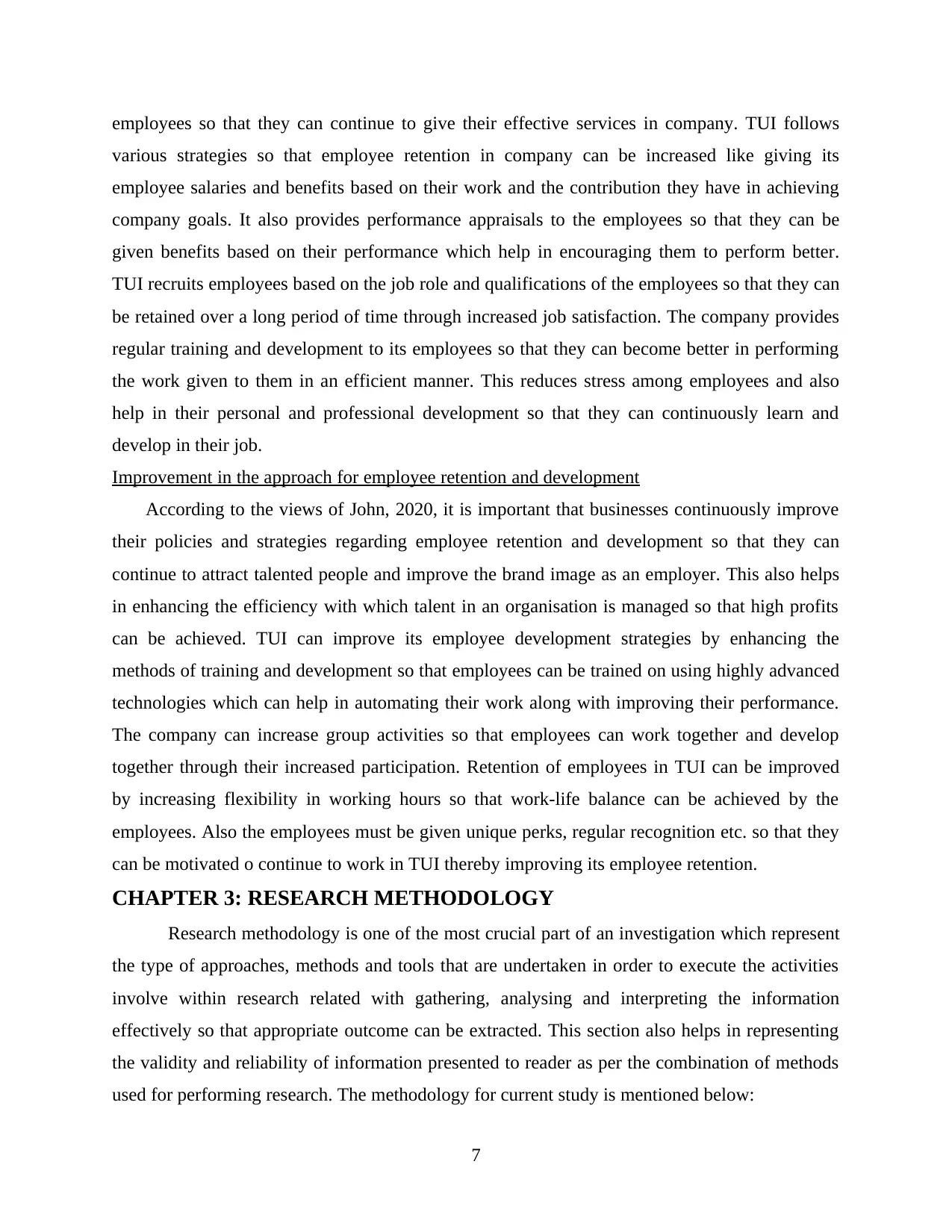
employees so that they can continue to give their effective services in company. TUI follows
various strategies so that employee retention in company can be increased like giving its
employee salaries and benefits based on their work and the contribution they have in achieving
company goals. It also provides performance appraisals to the employees so that they can be
given benefits based on their performance which help in encouraging them to perform better.
TUI recruits employees based on the job role and qualifications of the employees so that they can
be retained over a long period of time through increased job satisfaction. The company provides
regular training and development to its employees so that they can become better in performing
the work given to them in an efficient manner. This reduces stress among employees and also
help in their personal and professional development so that they can continuously learn and
develop in their job.
Improvement in the approach for employee retention and development
According to the views of John, 2020, it is important that businesses continuously improve
their policies and strategies regarding employee retention and development so that they can
continue to attract talented people and improve the brand image as an employer. This also helps
in enhancing the efficiency with which talent in an organisation is managed so that high profits
can be achieved. TUI can improve its employee development strategies by enhancing the
methods of training and development so that employees can be trained on using highly advanced
technologies which can help in automating their work along with improving their performance.
The company can increase group activities so that employees can work together and develop
together through their increased participation. Retention of employees in TUI can be improved
by increasing flexibility in working hours so that work-life balance can be achieved by the
employees. Also the employees must be given unique perks, regular recognition etc. so that they
can be motivated o continue to work in TUI thereby improving its employee retention.
CHAPTER 3: RESEARCH METHODOLOGY
Research methodology is one of the most crucial part of an investigation which represent
the type of approaches, methods and tools that are undertaken in order to execute the activities
involve within research related with gathering, analysing and interpreting the information
effectively so that appropriate outcome can be extracted. This section also helps in representing
the validity and reliability of information presented to reader as per the combination of methods
used for performing research. The methodology for current study is mentioned below:
7
various strategies so that employee retention in company can be increased like giving its
employee salaries and benefits based on their work and the contribution they have in achieving
company goals. It also provides performance appraisals to the employees so that they can be
given benefits based on their performance which help in encouraging them to perform better.
TUI recruits employees based on the job role and qualifications of the employees so that they can
be retained over a long period of time through increased job satisfaction. The company provides
regular training and development to its employees so that they can become better in performing
the work given to them in an efficient manner. This reduces stress among employees and also
help in their personal and professional development so that they can continuously learn and
develop in their job.
Improvement in the approach for employee retention and development
According to the views of John, 2020, it is important that businesses continuously improve
their policies and strategies regarding employee retention and development so that they can
continue to attract talented people and improve the brand image as an employer. This also helps
in enhancing the efficiency with which talent in an organisation is managed so that high profits
can be achieved. TUI can improve its employee development strategies by enhancing the
methods of training and development so that employees can be trained on using highly advanced
technologies which can help in automating their work along with improving their performance.
The company can increase group activities so that employees can work together and develop
together through their increased participation. Retention of employees in TUI can be improved
by increasing flexibility in working hours so that work-life balance can be achieved by the
employees. Also the employees must be given unique perks, regular recognition etc. so that they
can be motivated o continue to work in TUI thereby improving its employee retention.
CHAPTER 3: RESEARCH METHODOLOGY
Research methodology is one of the most crucial part of an investigation which represent
the type of approaches, methods and tools that are undertaken in order to execute the activities
involve within research related with gathering, analysing and interpreting the information
effectively so that appropriate outcome can be extracted. This section also helps in representing
the validity and reliability of information presented to reader as per the combination of methods
used for performing research. The methodology for current study is mentioned below:
7
Paraphrase This Document
Need a fresh take? Get an instant paraphrase of this document with our AI Paraphraser
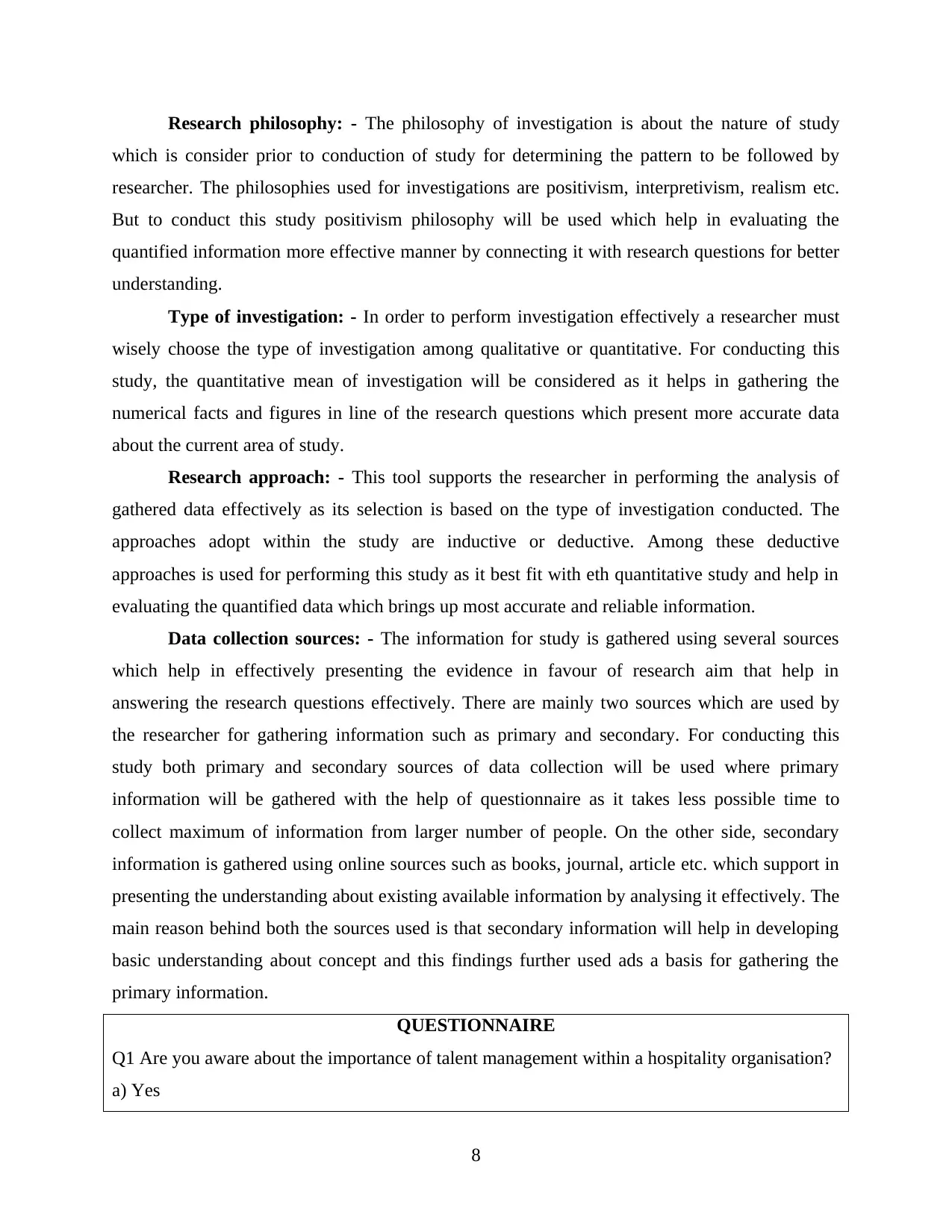
Research philosophy: - The philosophy of investigation is about the nature of study
which is consider prior to conduction of study for determining the pattern to be followed by
researcher. The philosophies used for investigations are positivism, interpretivism, realism etc.
But to conduct this study positivism philosophy will be used which help in evaluating the
quantified information more effective manner by connecting it with research questions for better
understanding.
Type of investigation: - In order to perform investigation effectively a researcher must
wisely choose the type of investigation among qualitative or quantitative. For conducting this
study, the quantitative mean of investigation will be considered as it helps in gathering the
numerical facts and figures in line of the research questions which present more accurate data
about the current area of study.
Research approach: - This tool supports the researcher in performing the analysis of
gathered data effectively as its selection is based on the type of investigation conducted. The
approaches adopt within the study are inductive or deductive. Among these deductive
approaches is used for performing this study as it best fit with eth quantitative study and help in
evaluating the quantified data which brings up most accurate and reliable information.
Data collection sources: - The information for study is gathered using several sources
which help in effectively presenting the evidence in favour of research aim that help in
answering the research questions effectively. There are mainly two sources which are used by
the researcher for gathering information such as primary and secondary. For conducting this
study both primary and secondary sources of data collection will be used where primary
information will be gathered with the help of questionnaire as it takes less possible time to
collect maximum of information from larger number of people. On the other side, secondary
information is gathered using online sources such as books, journal, article etc. which support in
presenting the understanding about existing available information by analysing it effectively. The
main reason behind both the sources used is that secondary information will help in developing
basic understanding about concept and this findings further used ads a basis for gathering the
primary information.
QUESTIONNAIRE
Q1 Are you aware about the importance of talent management within a hospitality organisation?
a) Yes
8
which is consider prior to conduction of study for determining the pattern to be followed by
researcher. The philosophies used for investigations are positivism, interpretivism, realism etc.
But to conduct this study positivism philosophy will be used which help in evaluating the
quantified information more effective manner by connecting it with research questions for better
understanding.
Type of investigation: - In order to perform investigation effectively a researcher must
wisely choose the type of investigation among qualitative or quantitative. For conducting this
study, the quantitative mean of investigation will be considered as it helps in gathering the
numerical facts and figures in line of the research questions which present more accurate data
about the current area of study.
Research approach: - This tool supports the researcher in performing the analysis of
gathered data effectively as its selection is based on the type of investigation conducted. The
approaches adopt within the study are inductive or deductive. Among these deductive
approaches is used for performing this study as it best fit with eth quantitative study and help in
evaluating the quantified data which brings up most accurate and reliable information.
Data collection sources: - The information for study is gathered using several sources
which help in effectively presenting the evidence in favour of research aim that help in
answering the research questions effectively. There are mainly two sources which are used by
the researcher for gathering information such as primary and secondary. For conducting this
study both primary and secondary sources of data collection will be used where primary
information will be gathered with the help of questionnaire as it takes less possible time to
collect maximum of information from larger number of people. On the other side, secondary
information is gathered using online sources such as books, journal, article etc. which support in
presenting the understanding about existing available information by analysing it effectively. The
main reason behind both the sources used is that secondary information will help in developing
basic understanding about concept and this findings further used ads a basis for gathering the
primary information.
QUESTIONNAIRE
Q1 Are you aware about the importance of talent management within a hospitality organisation?
a) Yes
8
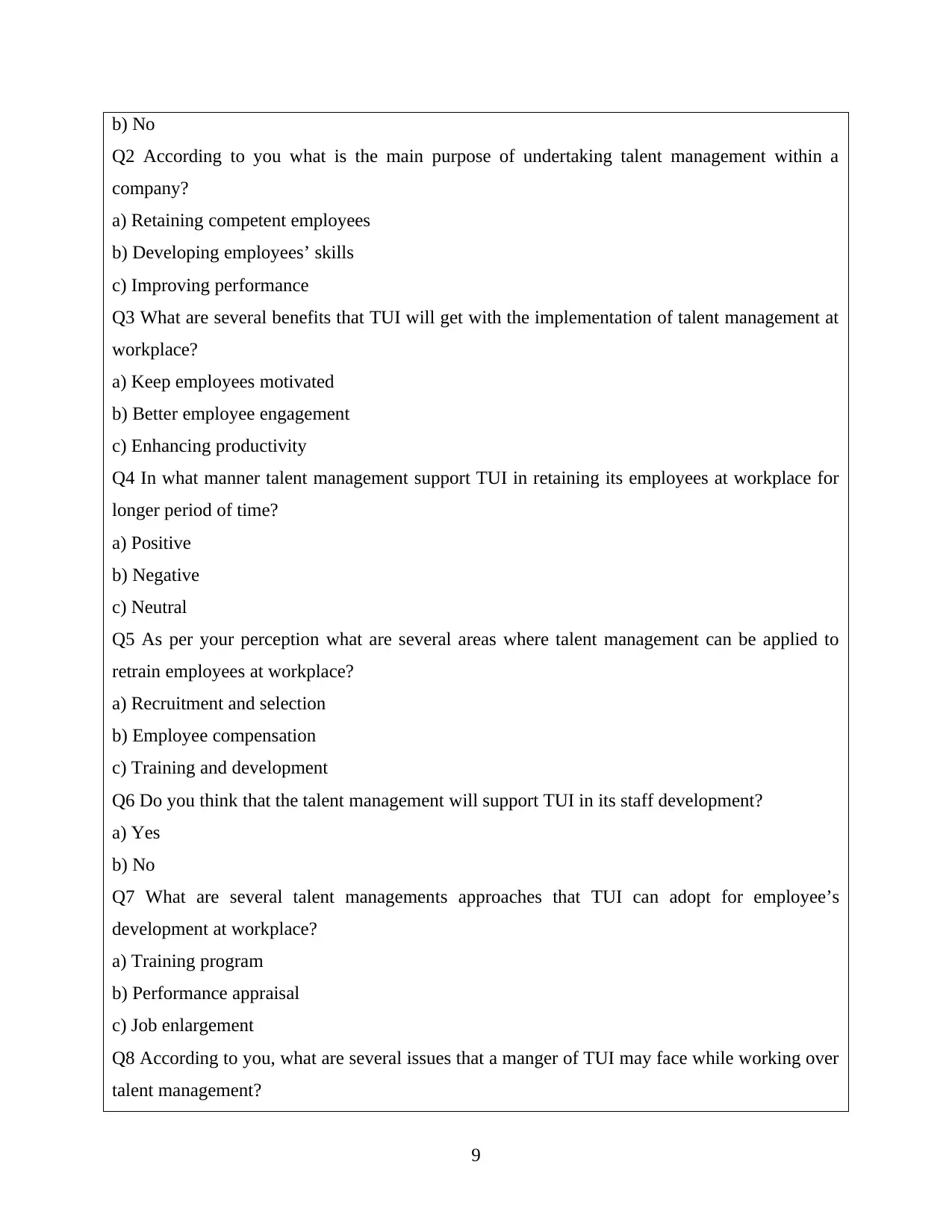
b) No
Q2 According to you what is the main purpose of undertaking talent management within a
company?
a) Retaining competent employees
b) Developing employees’ skills
c) Improving performance
Q3 What are several benefits that TUI will get with the implementation of talent management at
workplace?
a) Keep employees motivated
b) Better employee engagement
c) Enhancing productivity
Q4 In what manner talent management support TUI in retaining its employees at workplace for
longer period of time?
a) Positive
b) Negative
c) Neutral
Q5 As per your perception what are several areas where talent management can be applied to
retrain employees at workplace?
a) Recruitment and selection
b) Employee compensation
c) Training and development
Q6 Do you think that the talent management will support TUI in its staff development?
a) Yes
b) No
Q7 What are several talent managements approaches that TUI can adopt for employee’s
development at workplace?
a) Training program
b) Performance appraisal
c) Job enlargement
Q8 According to you, what are several issues that a manger of TUI may face while working over
talent management?
9
Q2 According to you what is the main purpose of undertaking talent management within a
company?
a) Retaining competent employees
b) Developing employees’ skills
c) Improving performance
Q3 What are several benefits that TUI will get with the implementation of talent management at
workplace?
a) Keep employees motivated
b) Better employee engagement
c) Enhancing productivity
Q4 In what manner talent management support TUI in retaining its employees at workplace for
longer period of time?
a) Positive
b) Negative
c) Neutral
Q5 As per your perception what are several areas where talent management can be applied to
retrain employees at workplace?
a) Recruitment and selection
b) Employee compensation
c) Training and development
Q6 Do you think that the talent management will support TUI in its staff development?
a) Yes
b) No
Q7 What are several talent managements approaches that TUI can adopt for employee’s
development at workplace?
a) Training program
b) Performance appraisal
c) Job enlargement
Q8 According to you, what are several issues that a manger of TUI may face while working over
talent management?
9
⊘ This is a preview!⊘
Do you want full access?
Subscribe today to unlock all pages.

Trusted by 1+ million students worldwide
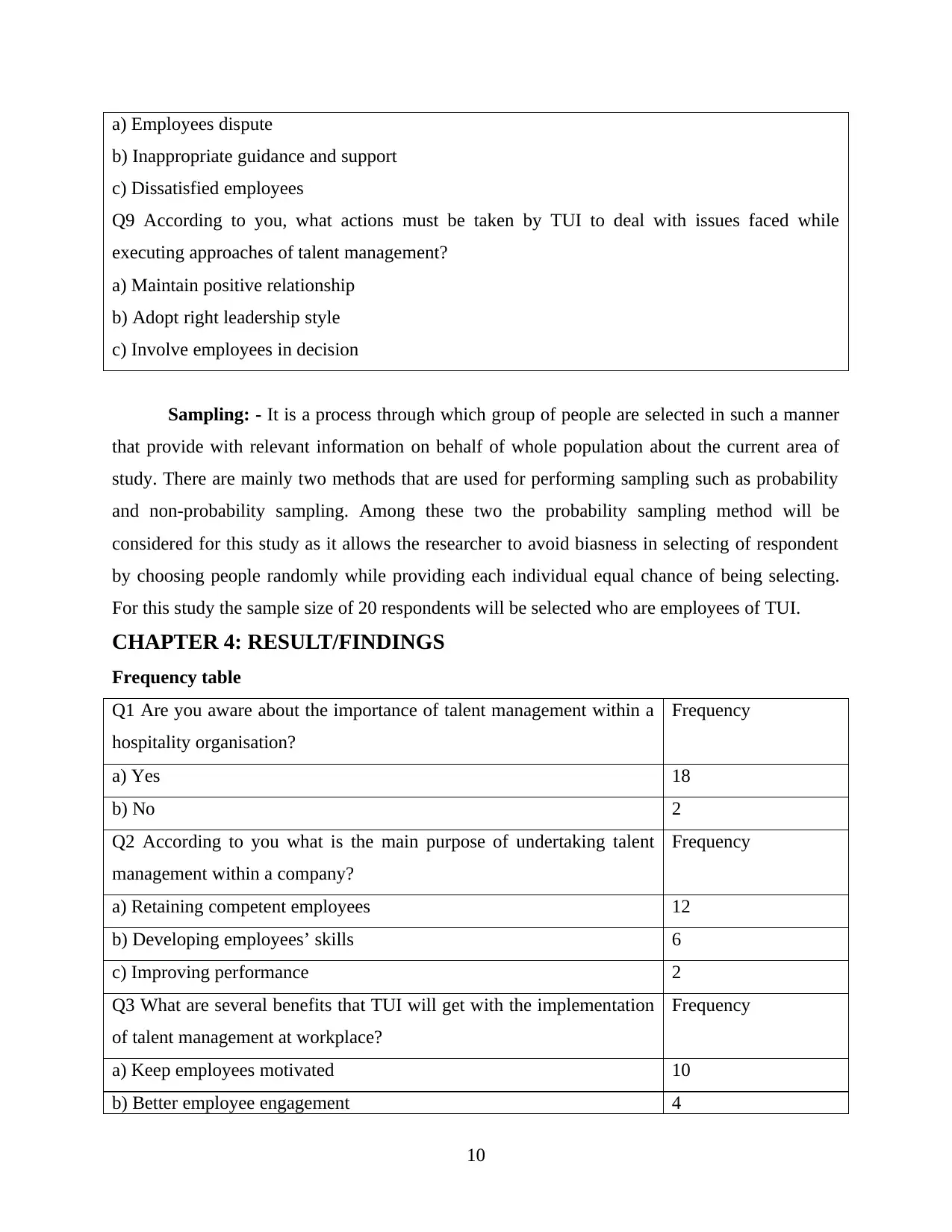
a) Employees dispute
b) Inappropriate guidance and support
c) Dissatisfied employees
Q9 According to you, what actions must be taken by TUI to deal with issues faced while
executing approaches of talent management?
a) Maintain positive relationship
b) Adopt right leadership style
c) Involve employees in decision
Sampling: - It is a process through which group of people are selected in such a manner
that provide with relevant information on behalf of whole population about the current area of
study. There are mainly two methods that are used for performing sampling such as probability
and non-probability sampling. Among these two the probability sampling method will be
considered for this study as it allows the researcher to avoid biasness in selecting of respondent
by choosing people randomly while providing each individual equal chance of being selecting.
For this study the sample size of 20 respondents will be selected who are employees of TUI.
CHAPTER 4: RESULT/FINDINGS
Frequency table
Q1 Are you aware about the importance of talent management within a
hospitality organisation?
Frequency
a) Yes 18
b) No 2
Q2 According to you what is the main purpose of undertaking talent
management within a company?
Frequency
a) Retaining competent employees 12
b) Developing employees’ skills 6
c) Improving performance 2
Q3 What are several benefits that TUI will get with the implementation
of talent management at workplace?
Frequency
a) Keep employees motivated 10
b) Better employee engagement 4
10
b) Inappropriate guidance and support
c) Dissatisfied employees
Q9 According to you, what actions must be taken by TUI to deal with issues faced while
executing approaches of talent management?
a) Maintain positive relationship
b) Adopt right leadership style
c) Involve employees in decision
Sampling: - It is a process through which group of people are selected in such a manner
that provide with relevant information on behalf of whole population about the current area of
study. There are mainly two methods that are used for performing sampling such as probability
and non-probability sampling. Among these two the probability sampling method will be
considered for this study as it allows the researcher to avoid biasness in selecting of respondent
by choosing people randomly while providing each individual equal chance of being selecting.
For this study the sample size of 20 respondents will be selected who are employees of TUI.
CHAPTER 4: RESULT/FINDINGS
Frequency table
Q1 Are you aware about the importance of talent management within a
hospitality organisation?
Frequency
a) Yes 18
b) No 2
Q2 According to you what is the main purpose of undertaking talent
management within a company?
Frequency
a) Retaining competent employees 12
b) Developing employees’ skills 6
c) Improving performance 2
Q3 What are several benefits that TUI will get with the implementation
of talent management at workplace?
Frequency
a) Keep employees motivated 10
b) Better employee engagement 4
10
Paraphrase This Document
Need a fresh take? Get an instant paraphrase of this document with our AI Paraphraser
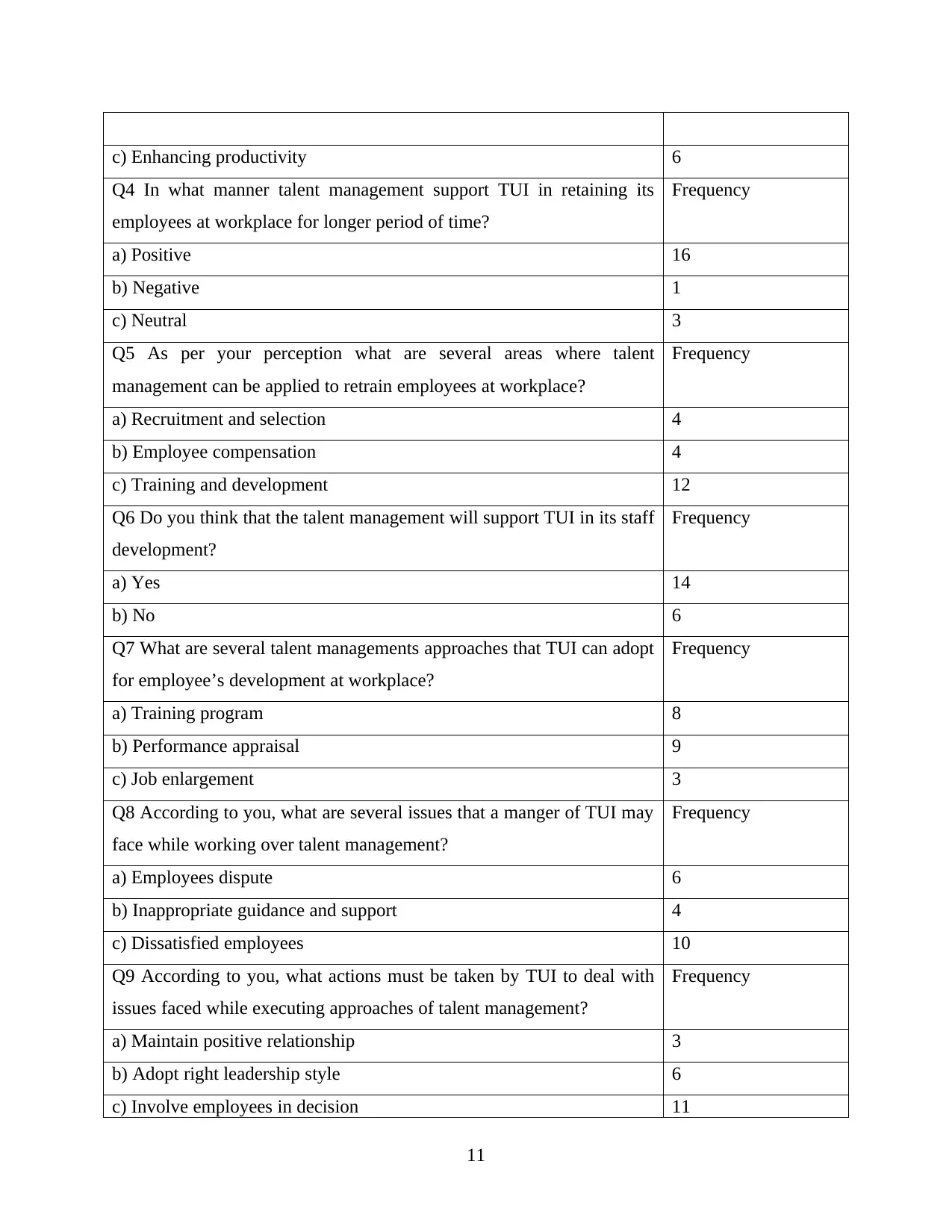
c) Enhancing productivity 6
Q4 In what manner talent management support TUI in retaining its
employees at workplace for longer period of time?
Frequency
a) Positive 16
b) Negative 1
c) Neutral 3
Q5 As per your perception what are several areas where talent
management can be applied to retrain employees at workplace?
Frequency
a) Recruitment and selection 4
b) Employee compensation 4
c) Training and development 12
Q6 Do you think that the talent management will support TUI in its staff
development?
Frequency
a) Yes 14
b) No 6
Q7 What are several talent managements approaches that TUI can adopt
for employee’s development at workplace?
Frequency
a) Training program 8
b) Performance appraisal 9
c) Job enlargement 3
Q8 According to you, what are several issues that a manger of TUI may
face while working over talent management?
Frequency
a) Employees dispute 6
b) Inappropriate guidance and support 4
c) Dissatisfied employees 10
Q9 According to you, what actions must be taken by TUI to deal with
issues faced while executing approaches of talent management?
Frequency
a) Maintain positive relationship 3
b) Adopt right leadership style 6
c) Involve employees in decision 11
11
Q4 In what manner talent management support TUI in retaining its
employees at workplace for longer period of time?
Frequency
a) Positive 16
b) Negative 1
c) Neutral 3
Q5 As per your perception what are several areas where talent
management can be applied to retrain employees at workplace?
Frequency
a) Recruitment and selection 4
b) Employee compensation 4
c) Training and development 12
Q6 Do you think that the talent management will support TUI in its staff
development?
Frequency
a) Yes 14
b) No 6
Q7 What are several talent managements approaches that TUI can adopt
for employee’s development at workplace?
Frequency
a) Training program 8
b) Performance appraisal 9
c) Job enlargement 3
Q8 According to you, what are several issues that a manger of TUI may
face while working over talent management?
Frequency
a) Employees dispute 6
b) Inappropriate guidance and support 4
c) Dissatisfied employees 10
Q9 According to you, what actions must be taken by TUI to deal with
issues faced while executing approaches of talent management?
Frequency
a) Maintain positive relationship 3
b) Adopt right leadership style 6
c) Involve employees in decision 11
11
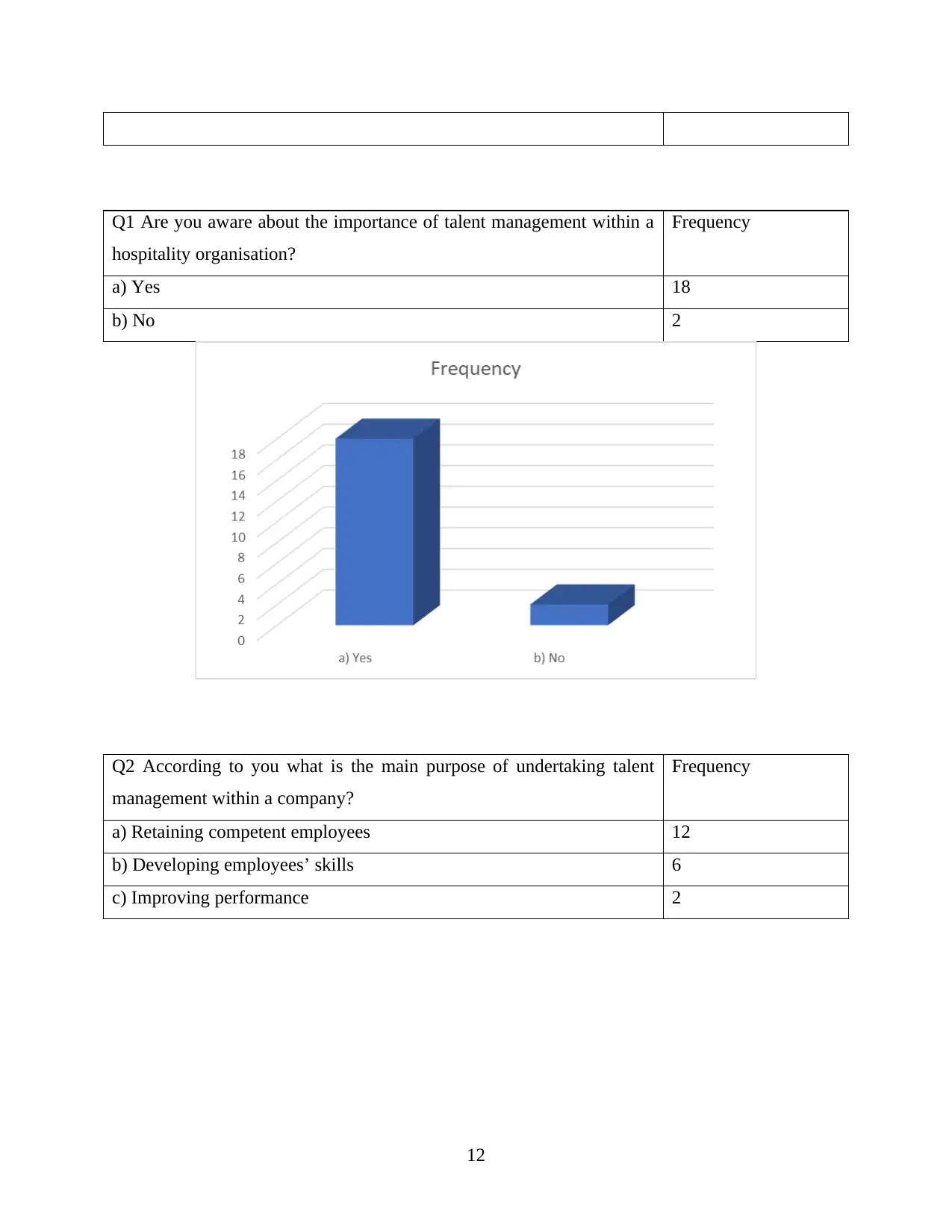
Q1 Are you aware about the importance of talent management within a
hospitality organisation?
Frequency
a) Yes 18
b) No 2
Q2 According to you what is the main purpose of undertaking talent
management within a company?
Frequency
a) Retaining competent employees 12
b) Developing employees’ skills 6
c) Improving performance 2
12
hospitality organisation?
Frequency
a) Yes 18
b) No 2
Q2 According to you what is the main purpose of undertaking talent
management within a company?
Frequency
a) Retaining competent employees 12
b) Developing employees’ skills 6
c) Improving performance 2
12
⊘ This is a preview!⊘
Do you want full access?
Subscribe today to unlock all pages.

Trusted by 1+ million students worldwide
1 out of 23
Related Documents
Your All-in-One AI-Powered Toolkit for Academic Success.
+13062052269
info@desklib.com
Available 24*7 on WhatsApp / Email
![[object Object]](/_next/static/media/star-bottom.7253800d.svg)
Unlock your academic potential
Copyright © 2020–2026 A2Z Services. All Rights Reserved. Developed and managed by ZUCOL.





